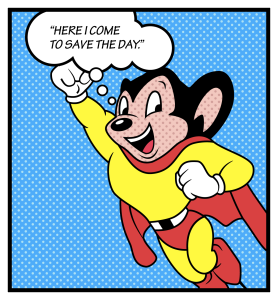“There’s not much traffic today.” My husband — my dear, sweet, non-neurotic, Midwestern husband — makes this benign observation, and I’m quick to shush him. “Don’t say that! The Evil Eye will hear you!” This is my Italian upbringing talking. Sicilians are mighty superstitious people, and they believe that the Evil Eye is just waiting for you to express some happiness or pleasure. Then, it will swoop in to gleefully relieve you of it. As soon as you say, “There’s not much traffic” you’ll find yourself able to count the blades of grass in the parkway median. The moment you observe, “What a lovely day,” it will pour. Exclaim, “I feel great!” you’ll be visited by ailments that would make Job’s suffering look like a day at the spa. If my family had a crest, it would say, “Whatever you do, never, never, tempt the Evil Eye.”
Now, I don’t really believe in the Evil Eye any more, but old habits die hard. The fact is, believing in magic (evil or otherwise) appeals to something primal in all of us. When confronted with things beyond our understanding or control, we instinctively seek to understand and control them. Sometimes this means seeking out a supernatural solution: astrology, Tarot cards, crystals, shamans, and psychics are just some of the kinds of “magic” people turn to when their own efforts fall short. Magic says: Make the right sacrifices, chant the right words, bring the right offering and whatever supernatural forces there are can be persuaded to grant your request.
Ultimately, magic is a transaction.
We present our desires, offer the prescribed words or actions, and voila! Easier than ordering a latte. This is why I think these forms of “magic” are so attractive to so many people. We think it is an impersonal, low-risk, “What have I got to lose?” proposition. And the best part is, if your wish is granted, the rest of your life remains unchanged and unchallenged. We think of magic as an encounter with the supernatural on our terms, and those are the terms we like best. (Of course, if you believe there is a malign force of evil in the world — and I do — than any encounter with it through magic is not spiritually neutral. We may think we are in control of this transaction, but we couldn’t be more wrong.)
Now, miracles are a different story. And by miracles I mean God’s intervention in our world in ways that defy our understanding of time, space and matter or are beyond any human ability.
If magic is a transaction, then God’s miracles are about revelation.
Scripture is full of God’s miracles: Creation. The parting of the Red Sea. Jesus healing the sick and feeding the multitudes. The resurrection. It is easy to think of most of these as God seeing a problem and fixing it. Need to get across a body of water? No problem. Not enough food to feed the multitudes? I’ve got this. Blind? lame? Possessed by demons? Bring it on.
While God’s miracles did accomplish those things, their purpose is much grander, much more cosmic than fixing problems. Every time God breaks into our world to act, it is an act of self-revelation. In creation, He is saying, “I am a creative God, a God of order and of beauty.” When He parted the Red Sea He was saying, “I am a God of rescue and restoration.” When Jesus feeds the five thousand, He is saying, “I am the God of provision.” When He heals, He is saying, “I am the God of Shalom — of wholeness and peace.” When He raises Jesus from the dead, He is saying, “With me, death never has the final word.”
God’s self-revelation is an invitation to relationship.
God is not making these proclamations just to hear Himself talk. He longs to be in relationship with his people, and as with any relationship, self-revelation is the first step. “This is who I am. This is how much I love you.”
I think this is exactly why some people have a hard time accepting God’s miracles. I have known people who were perfectly willing to believe that the scent of apple blossoms would help them find their lost keys, but flatly reject God’s miracles. I have known people who believe that shaman incantations can cure disease, but consider Jesus’ healing miracles laughable.
I think that we know instinctively that God’s miracles are inviting us into something deeper, something beautiful and just a little frightening. On the most basic level, it means acknowledging there is a Creator God who is powerful beyond our understanding and operates in ways we can’t predict, often don’t understand and can’t control. In short, there is a God, and it’s not me. For independent, self-actualizing, self-sufficient, self-made people, this can be a tough pill to swallow.
Unlike magic, which leaves us unchanged and unchallenged, meeting the God Who Reveals Himself leaves open the possibility of new life. And while new life with God can mean liberation from things we long to shed, it can also mean that God will ask us to let go of things we want to hold onto. This, too, can be a stumbling block.
In His miracles, God declares, “This is who I am. This is how much I love you.” No forces of magic offer this. No Evil Eye is interested in our flourishing, our peace, our joy. No amorphous auras care about our pain, much less want to enter into it. The Universe doesn’t wait with outstretched arms for us to come “home”. It is only the God who creates, parts the sea, heals, feeds and defeats death who does that.





